
Carex abrupta is a species of sedge known by the common name abrupt-beaked sedge or abruptbeak sedge. It is native to the western United States from California to Idaho, where it grows in moist mountain habitat such as meadows.

Carex athrostachya is a species of sedge known by the common name slenderbeak sedge. It is native to western North America, including Alaska to central Canada, the western contiguous United States, and just into Baja California.
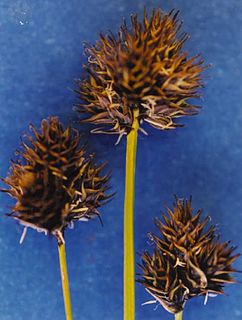
Carex haydeniana is a species of sedge known by the common name cloud sedge.
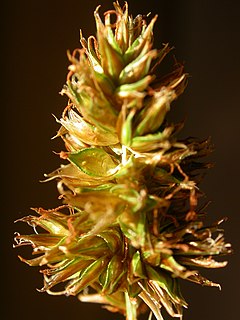
Carex hoodii is a species of sedge known by the common name Hood's sedge. It is native to western North America from Alaska to Nunavut to California to South Dakota, where it grows in dry to moist habitat in forests and on mountain slopes.

Carex illota is a species of sedge known by the common name sheep sedge. It is native to western North America, where it grows in wet places such as marshes and mountain meadows, from New Mexico and California north to Western Canada.

Carex jonesii is a species of sedge known by the common name Jones' sedge. It is native to the Western United States and grows in moist habitats.

Carex leporinella is a species of sedge known by the common name Sierra hare sedge.

Carex leptalea is a species of sedge known by the common names bristly-stalked sedge and flaccid sedge. It is native to much of North America including most of Canada, the Dominican Republic, and the United States. It only grows in wetlands. This sedge produces dense clusters of thin stems up to 70 centimeters tall from a network of branching rhizomes. The thin, deep green leaves are soft, hairless, and sometimes drooping. The inflorescence is up to 16 millimeters long but only 2 to 3 millimeters wide, and is yellow-green in color. There are only a few perigynia on each spikelet, and they are green and veined.
- Carex leptalea subsp. harperi(Fernald) W.Stone - southeastern US from Texas and Florida north to Missouri and Pennsylvania
- Carex leptalea subsp. leptalea - widespread from Alaska east to Nunavut and south to California and Dominican Republic
- Carex leptalea subsp. pacificaCalder & Roy L.Taylor - Washington State, British Columbia, southeastern Alaska

Carex luzulina is a species of sedge known by the common name woodrush sedge.

Carex mariposana is a species of sedge known by the common name Mariposa sedge.

Carex microptera is a species of sedge known by the common name smallwing sedge. It is native to western North America, including most all of western Canada and the western United States. It occurs in moist mountain habitat such as meadows and riverbanks. This sedge produces dense clumps of erect stems over 20 centimeters tall and up to about a meter in height. The inflorescence is a dense cluster of green or brown spikes packed tightly and indistinct from each other.
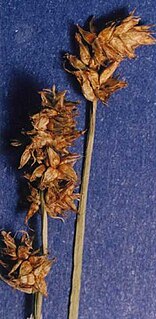
Carex nervina is a species of sedge known by the common name Sierra sedge.
Carex petasata is a species of sedge known by the common name Liddon sedge.

Carex phaeocephala is a species of sedge known by the common name dunhead sedge.
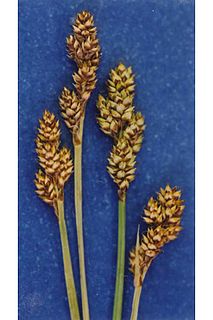
Carex praeceptorum is a species of sedge known by the common names early sedge and teacher's sedge.

Carex scoparia is a species of sedge known by the common names broom sedge and pointed broom sedge. It should not be confused with the unrelated grass species known as "broom sedge," Andropogon virginicus.
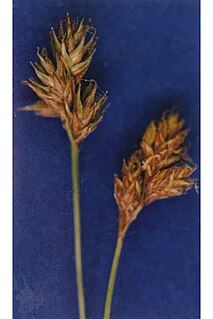
Carex straminiformis is a species of sedge known by the common name Shasta sedge.
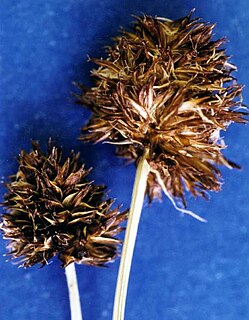
Carex vernacula is a species of sedge known by the common name native sedge.

Carex concinna is a species of sedge known by the common names low northern sedge, northern elegant sedge, beauty sedge, and beautiful sedge. It is native to northern North America, where it occurs across Canada and in high elevations in the northern contiguous United States.
Carex lemmonii, or Lemmon's sedge, is a plant in the sedge family, and is endemic to California. Carex albida is now considered a synonym, but was previously thought to be a separate species; such plants have the common name white sedge.
This page is based on this
Wikipedia article Text is available under the
CC BY-SA 4.0 license; additional terms may apply.
Images, videos and audio are available under their respective licenses.


















